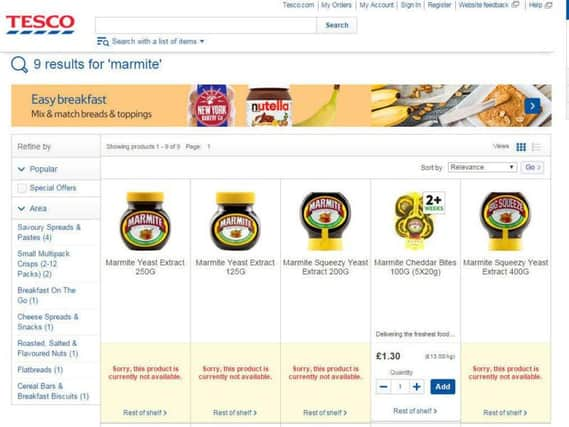Major brands axed from Tesco shelves following Unilever dispute


Unilever is believed to have demanded a 10% price rise due to the falling value of sterling, halting deliveries to Tescowhen it refused.
The stand-off has left the supermarket facing a shortage of brands such as Surf washing powder, Comfort fabric conditioner, Hellmann's mayonnaise, Pot Noodle and Ben & Jerry's Ice Cream.
Advertisement
Hide AdAdvertisement
Hide AdThe move is understood to have hit online sales rather than products in store. Shoppers trying to buy items from Tesco's website on Wednesday were met with the message "Sorry, this product is currently not available".
It is thought a number of supermarkets are embroiled in the row with Unilever, which earlier this year posted profits of around £2 billion for the first half of 2016.
Unilever refused to comment on the dispute, but chief executive Paul Polman warned in June that a vote to leave the EU's single market would increase prices for consumers.
He told Channel 4 that a vote to Leave would mean hikes in import duties on items such as dairy products, leading to price rises that would affect consumers.
Advertisement
Hide AdAdvertisement
Hide AdCiting the example of Wall's Magnum ice cream, Mr Polman warned about trade restrictions, saying: "Undoubtedly if the UK were to Leave, the conditions will not be as good as if they stay in."
But MPs condemned Unilever, saying the company was using Brexit as an excuse to exploit consumers, and warned it may be damaging its brand.
Conservative MP Sir Gerald Howarth told the Daily Telegraph: "I think it will be very damaging to the reputation of Unilever if they seek to use the fall in the pound to exploit the consumer.
"Clearly products which are not dependent upon imports into the United Kingdom will not be affected by the fall in the value of the pound.
Advertisement
Hide AdAdvertisement
Hide Ad"Consumers will switch to other products where companies aren't seeking to fleece the consumer."
Liberal Democrat leader Tim Farron blamed the Government, saying: "The chaos around Brexit is now hitting our supermarket shelves. This shows the Government don't have a plan or even a clue."
The dispute came on a tumultuous day for the pound on the foreign exchanges, which at one point saw sterling lose almost 1% of it value against the dollar during the course of exchanges in the House of Commons, before staging a rally.
Tesco last week revealed its half-year profits dropped by more than a quarter to £71 million after being hit by the sector's price war, although it recorded sales growth for a third quarter in a row.
Advertisement
Hide AdAdvertisement
Hide AdThe company's chief executive, Dave Lewis - the former president of the personal care range at Unilever - warned the market remains "challenging and uncertain", with food price deflation unlikely to ease soon.
A Tesco spokesman said: "We are currently experiencing availability issues on a number of Unilever products. We hope to have this issue resolved soon."
Tesco had a significant rift with Premier Foods, the maker of Ambrosia, Oxo and Mr Kipling cakes, in 2011 when the supermarket refused to stock products after the supplier tried to pass on a cost hike.
Former chief executives of Tesco, Sainsbury's, Asda, Morrisons, Marks & Spencer and B&Q all warned ahead of the EU referendum that a drop in the pound - coupled with supply chain disruption - would cause prices to spike.
Advertisement
Hide AdAdvertisement
Hide AdThe Tesco stand-off with Unilever came hours after former Sainsbury's boss Justin King said shoppers should expect price rises after the fall in the value of the pound since the Brexit vote.
Mr King warned supermarkets would struggle to absorb the rise in the cost of importing goods because of the devalued pound, meaning consumers would face higher prices, The Guardian said.
Speaking at a conference in London on Wednesday, Mr King said: "Retailers' margins are already squeezed. So there is no room to absorb input price pressures and costs will need to be passed on."
He added: "No business wants to be the first to blame Brexit for a rise in prices. But once someone does, there will be a flood of companies because they will all be suffering."